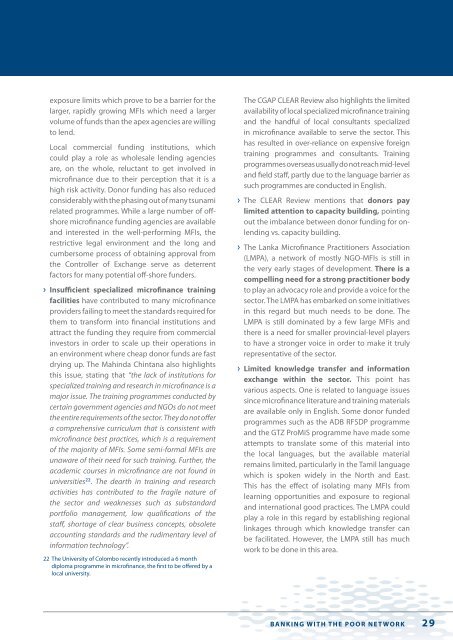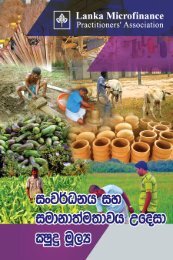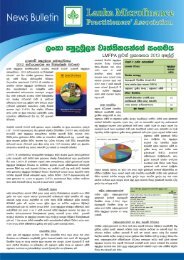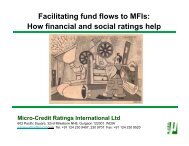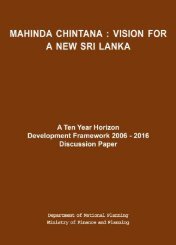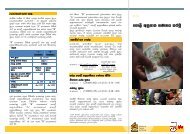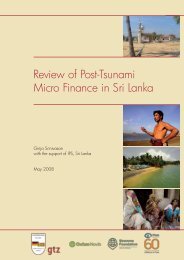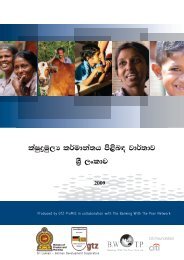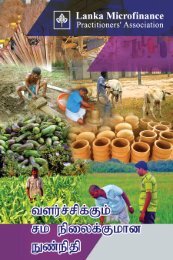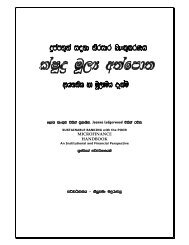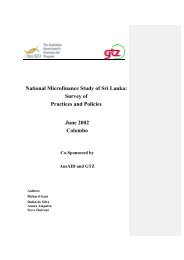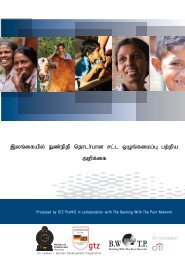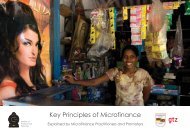Microfinance Industry Report SRI LANKA - Microfinance in Sri Lanka
Microfinance Industry Report SRI LANKA - Microfinance in Sri Lanka
Microfinance Industry Report SRI LANKA - Microfinance in Sri Lanka
You also want an ePaper? Increase the reach of your titles
YUMPU automatically turns print PDFs into web optimized ePapers that Google loves.
exposure limits which prove to be a barrier for the<br />
larger, rapidly grow<strong>in</strong>g MFIs which need a larger<br />
volume of funds than the apex agencies are will<strong>in</strong>g<br />
to lend.<br />
Local commercial fund<strong>in</strong>g <strong>in</strong>stitutions, which<br />
could play a role as wholesale lend<strong>in</strong>g agencies<br />
are, on the whole, reluctant to get <strong>in</strong>volved <strong>in</strong><br />
microf<strong>in</strong>ance due to their perception that it is a<br />
high risk activity. Donor fund<strong>in</strong>g has also reduced<br />
considerably with the phas<strong>in</strong>g out of many tsunami<br />
related programmes. While a large number of offshore<br />
microf<strong>in</strong>ance fund<strong>in</strong>g agencies are available<br />
and <strong>in</strong>terested <strong>in</strong> the well-perform<strong>in</strong>g MFIs, the<br />
restrictive legal environment and the long and<br />
cumbersome process of obta<strong>in</strong><strong>in</strong>g approval from<br />
the Controller of Exchange serve as deterrent<br />
factors for many potential off-shore funders.<br />
>> Insufficient specialized microf<strong>in</strong>ance tra<strong>in</strong><strong>in</strong>g<br />
facilities have contributed to many microf<strong>in</strong>ance<br />
providers fail<strong>in</strong>g to meet the standards required for<br />
them to transform <strong>in</strong>to f<strong>in</strong>ancial <strong>in</strong>stitutions and<br />
attract the fund<strong>in</strong>g they require from commercial<br />
<strong>in</strong>vestors <strong>in</strong> order to scale up their operations <strong>in</strong><br />
an environment where cheap donor funds are fast<br />
dry<strong>in</strong>g up. The Mah<strong>in</strong>da Ch<strong>in</strong>tana also highlights<br />
this issue, stat<strong>in</strong>g that “the lack of <strong>in</strong>stitutions for<br />
specialized tra<strong>in</strong><strong>in</strong>g and research <strong>in</strong> microf<strong>in</strong>ance is a<br />
major issue. The tra<strong>in</strong><strong>in</strong>g programmes conducted by<br />
certa<strong>in</strong> government agencies and NGOs do not meet<br />
the entire requirements of the sector. They do not offer<br />
a comprehensive curriculum that is consistent with<br />
microf<strong>in</strong>ance best practices, which is a requirement<br />
of the majority of MFIs. Some semi-formal MFIs are<br />
unaware of their need for such tra<strong>in</strong><strong>in</strong>g. Further, the<br />
academic courses <strong>in</strong> microf<strong>in</strong>ance are not found <strong>in</strong><br />
universities 22 . The dearth <strong>in</strong> tra<strong>in</strong><strong>in</strong>g and research<br />
activities has contributed to the fragile nature of<br />
the sector and weaknesses such as substandard<br />
portfolio management, low qualifications of the<br />
staff, shortage of clear bus<strong>in</strong>ess concepts, obsolete<br />
account<strong>in</strong>g standards and the rudimentary level of<br />
<strong>in</strong>formation technology”.<br />
22 The University of Colombo recently <strong>in</strong>troduced a 6 month<br />
diploma programme <strong>in</strong> microf<strong>in</strong>ance, the first to be offered by a<br />
local university.<br />
The CGAP CLEAR Review also highlights the limited<br />
availability of local specialized microf<strong>in</strong>ance tra<strong>in</strong><strong>in</strong>g<br />
and the handful of local consultants specialized<br />
<strong>in</strong> microf<strong>in</strong>ance available to serve the sector. This<br />
has resulted <strong>in</strong> over-reliance on expensive foreign<br />
tra<strong>in</strong><strong>in</strong>g programmes and consultants. Tra<strong>in</strong><strong>in</strong>g<br />
programmes overseas usually do not reach mid-level<br />
and field staff, partly due to the language barrier as<br />
such programmes are conducted <strong>in</strong> English.<br />
> > The CLEAR Review mentions that donors pay<br />
limited attention to capacity build<strong>in</strong>g, po<strong>in</strong>t<strong>in</strong>g<br />
out the imbalance between donor fund<strong>in</strong>g for onlend<strong>in</strong>g<br />
vs. capacity build<strong>in</strong>g.<br />
>> The <strong>Lanka</strong> <strong>Microf<strong>in</strong>ance</strong> Practitioners Association<br />
(LMPA), a network of mostly NGO-MFIs is still <strong>in</strong><br />
the very early stages of development. There is a<br />
compell<strong>in</strong>g need for a strong practitioner body<br />
to play an advocacy role and provide a voice for the<br />
sector. The LMPA has embarked on some <strong>in</strong>itiatives<br />
<strong>in</strong> this regard but much needs to be done. The<br />
LMPA is still dom<strong>in</strong>ated by a few large MFIs and<br />
there is a need for smaller prov<strong>in</strong>cial-level players<br />
to have a stronger voice <strong>in</strong> order to make it truly<br />
representative of the sector.<br />
>> Limited knowledge transfer and <strong>in</strong>formation<br />
exchange with<strong>in</strong> the sector. This po<strong>in</strong>t has<br />
various aspects. One is related to language issues<br />
s<strong>in</strong>ce microf<strong>in</strong>ance literature and tra<strong>in</strong><strong>in</strong>g materials<br />
are available only <strong>in</strong> English. Some donor funded<br />
programmes such as the ADB RFSDP programme<br />
and the GTZ ProMiS programme have made some<br />
attempts to translate some of this material <strong>in</strong>to<br />
the local languages, but the available material<br />
rema<strong>in</strong>s limited, particularly <strong>in</strong> the Tamil language<br />
which is spoken widely <strong>in</strong> the North and East.<br />
This has the effect of isolat<strong>in</strong>g many MFIs from<br />
learn<strong>in</strong>g opportunities and exposure to regional<br />
and <strong>in</strong>ternational good practices. The LMPA could<br />
play a role <strong>in</strong> this regard by establish<strong>in</strong>g regional<br />
l<strong>in</strong>kages through which knowledge transfer can<br />
be facilitated. However, the LMPA still has much<br />
work to be done <strong>in</strong> this area.<br />
Bank<strong>in</strong>g With The Poor Network 29


